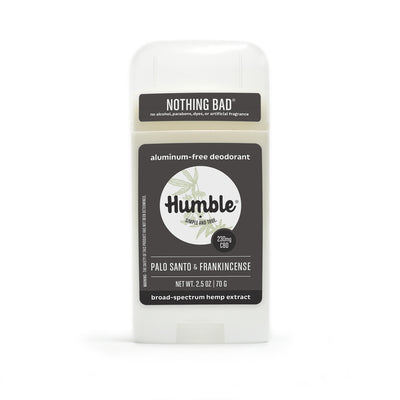Cannabidiol Oil vs Hemp Oil: What’s the Difference?
The world of CBD products can be a wee bit confusing. There is a lot of terminology floating around out there, not to mention the hemp plant is the source of a variety of ingredients used for an array of purposes.
So, what are the different ingredients out there? What are they used for? And what should you look for in your CBD body care products? Let’s get you some answers. We’re going to get a little bit sciency, but don’t worry, we promise it’ll be fun.

Hemp and its many names
Before we get things underway, let’s clear up a few terms that are often used interchangeably.
CBD stands for cannabidiol. You might see the name CBD oil or cannabidiol oil. Know they are the same thing. Additionally, broad spectrum hemp extract is also the same thing, though hemp oil isn’t always. Thoroughly confused? Always take a close look at the label before you buy any product, but especially when it comes to those containing hemp and CBD. To help you better understand what to look for, we’ll discuss both types of oil and their uses in body care.

What is hemp?
Hemp is a plant of the species cannabis sativa. It is used in an array of industries for a variety of purposes, from textiles to body care, even food and building materials. The cannabis plant, used in products that can only be purchased at dispensaries, is also of the cannabis sativa species. But while the two plants look similar, their genetic makeup is different due to the content of THC each contains.
Does hemp contain CBD or THC?
You may be familiar with the acronyms CBD and THC. These refer to chemical compounds found in cannabis sativa. As you learned in the section above, CBD stands for cannabidiol. THC stands for tetrahydrocannabinol. These are two of about 100 chemical compounds called cannabinoids found in the cannabis sativa plant. Both hemp and cannabis contain these compounds, but hemp only contains 0.3% or less THC1. This tiny amount won’t produce a high and is in compliance with federal and state guidelines2.
Is CBD legal?
CBD/hemp products are non-intoxicating and considered legal, while products containing THC, a psychoactive compound, are not approved by the U.S. federal government2.

What is cannabidiol oil?
Cannabidiol oil, aka CBD oil, is made by extracting the cannabidiol from the hemp plant using carbon dioxide. The extract can be made from the plant's flowers, and contains high concentrations of CBD.
What is hemp oil?
By contrast, hemp oil contains little to no CBD. Often referred to as hemp seed oil, the seeds of the hemp plant are cold pressed to produce an oil. Like other nut and seed oils, hemp seed oil contains a high amount of polyunsaturated fatty acids, rich in omega-3s and other healthy properties3.

What to look for in CBD body care products
In 2018, CBD was legalized by the U.S. Congress if it comes from hemp4. Because it is a newly legalized ingredient, research is ongoing. Although CBD is regulated by the FDA, only a seizure medication has received the FDA’s seal of approval2. This means it is in the consumer’s hands to do their own due diligence. Here are a few things to look for:
CBD Oil
Products containing CBD oil offer the benefits of CBD. It may be listed on the label as: cbd oil, cannabidiol oil, broad spectrum hemp extract, full spectrum hemp extract, hemp oil extract, hemp extract oil, or hemp whole-plant powder.
Hemp Oil
Hemp oil itself does not contain CBD, but it may be used in products containing CBD. Additionally, hemp oil may be used as a carrier oil for CBD oil. Hemp oil contains a range of essential fatty acids, antioxidants, and nutrients. You may find hemp oil listed on a label as: hemp oil or hemp seed oil. By contrast, hemp oil extract or hemp extract oil contain CBD, so it’s important to read the label carefully.
Broadspectrum CBD
Broadspectrum CBD contains several cannabinoids, but is processed to remove most of the THC in the oil to a non-detectable amount. A broad spectrum hemp extract will have a full phyto-cannabiniod profile which includes CBD, but the THC has been removed.
Full Spectrum CBD
Full spectrum CBD is nearly identical to broadspectrum CBD. The only difference is that while THC exists only in small amounts, an additional processing step has not been taken to remove it.
Organic
Growing practices vary greatly from farm to farm. Look for brands that are sourcing hemp from companies that prioritize organic and regenerative farming. These practices yield the highest quality CBD with less impact on the environment and communities.
Purity & Quality
To hold companies accountable, Certificates of Analysis (COAs) are a report by an accredited laboratory detailing a product’s cannabinoid profile. The certificate will list all cannabinoid compounds, including the amount of CBD and THC. Look for and review a product's COA before buying.
What to expect from Humble Brands CBD products
All of our CBD products contain high quality, organic broadspectrum cbd oil (listed on our product labels as organic broad-spectrum hemp extract) and are third party tested. They contain less than 0.01% to 0% THC, and therefore, no intoxicating properties. What’s more, we work with a collective of Colorado farms that are Regenerative Organic Certified. Their unique set of agricultural practices meet the highest standards in the world.
Disclaimer: All information provided is for informational and entertainment purposes only. It is not intended to be, nor should be interpreted as, medical advice. This information has not been evaluated by the FDA and Humble Brands products are not intended to diagnose, treat, cure, or prevent any disease. Always consult your physician or other qualified health provider with questions you have regarding your health. Although every effort has been made to ensure the information published is accurate, Humble Brands accepts no responsibility or liability.




